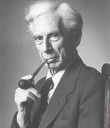Interview with Bertrand Russell - John Freeman on Face to Face in 1959

In April of 1959 the British philosopher and mathematician Bertrand Russell sat down with John Freeman of the BBC program Face to Face for a brief but wide-ranging and candid interview. Russell reminisced about his early attraction to mathematics. “I got the sort of satisfaction that Plato says you can get out of mathematics,” he said. “It was an eternal world. It was a timeless world. It was a world where there was a possibility of a certain kind of perfection.”
Russell, of course, distinguished himself in that rarified world as one of the founders of analytic philosophy and a co-author of Principia Mathematica, a landmark work that sought to derive all of mathematics from a set of logical axioms. Although the Principia fell short of its goal, it made an enormous mark on the course of 20th century thought. When World War I came along, though, Russell felt it was time to come down from the ivory tower of abstract thinking. “This world is too bad,” Russell told Freeman. “We must notice it.”
The half-hour conversation, shown above in its entirety, is of a quality rarely seen on television today. The interviewer Freeman was at that time a former Member of Parliament and a future Ambassador to the United States. Russell talks with him about his childhood, his views on religion, his political and social activism, even his amusing conviction that smoking extended his life. But perhaps the most famous moment comes at the end, when Freeman asks the old philosopher what message he would offer to people living a thousand years hence. In answering the question, Russell balances the two great spheres that occupied his life:
I should like to say two things, one intellectual and one moral:
The intellectual thing I should want to say to them is this: When you are studying any matter or considering any philosophy, ask yourself only what are the facts and what is the truth that the facts bear out. Never let yourself be diverted either by what you wish to believe or by what you think would have beneficent social effects if it were believed, but look only and solely at what are the facts. That is the intellectual thing that I should wish to say.
The moral thing I should wish to say to them is very simple. I should say: Love is wise, hatred is foolish. In this world, which is getting more and more closely interconnected, we have to learn to tolerate each other. We have to learn to put up with the fact that some people say things that we don’t like. We can only live together in that way, and if we are to live together and not die together we must learn a kind of charity and a kind of tolerance which is absolutely vital to the continuation of human life on this planet.